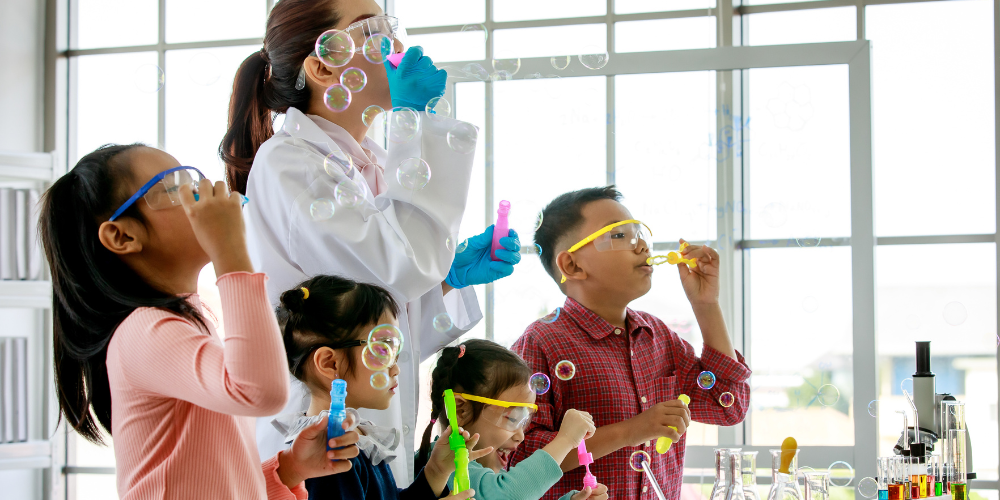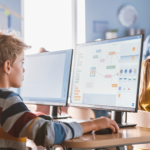In a recent episode of Teaching Channel Talks, Dr. Wendy Amato was joined by science educator Carrie Weber to discuss the importance of experiential learning in science. Catch up on Carrie and Wendy’s conversation below about promoting hands-on exploration by encouraging students to observe their surroundings and ask curious questions.
Wendy: Let’s jump in with an understanding of what experiential learning is in the sciences.
Carrie: That is a great question and often misunderstood. Experiential learning is essentially learning by doing, so the important thing is you never want to tell students what they are supposed to know. You want to help students discover those things on their own and create experiences for students. You don’t want to tell students we are going to prove this is true, that is not how science works. You want them to discover something, then learn that everyone has discovered that, and therefore we can assume that it will act that way.
Wendy: Carrie, you’ve got a Secondary Science Masters in Teaching, are you telling me that this is how you were taught to teach?
Carrie: It was more of something I figured out in year two of teaching by really reflecting on what worked well, what students enjoyed, and the ways that students were learning. This is something that is talked about when you study education, but I don’t think you can really understand until you are one-on-one with students and see them in action.
Wendy: I’m really glad to hear this because I found in my own experience that the real ways of teaching had to be acquired in the field and with students. The things that we learned in graduate programs have their place, but when you’re where the rubber meets the road with students in front of you, it shifts a little.
Carrie: It does shift a little bit and I think what you learn in school is a very good foundation. But what you learn in school doesn’t have to be the exact way that you choose to do it in your classroom.
Wendy: Let’s talk about some of the things that you’ve been discovering now that your work has transitioned from classroom teaching to being a leader for science programs that are exclusively field experiences.
Carrie: Well, these Field experiences are more than “We’re going to go to this particular watershed and see what is happening.” We’re also going to ask, “How is the weather today different from what it was yesterday?” Everywhere you go, you’re observing, and I think that something that is not considered enough is how students learn by doing. They have to just observe.
Wendy: So we want students to be curious all the time.
Carrie: Right, the number one outcome for me is curiosity, which drives inquiry in my opinion.
Wendy: Tell me more about inquiry, what does it mean?
Carrie: Hopefully we’re teaching students how to draw inferences from inquiry and how to support their ideas with evidence. It’s the same concept that I hope is being taught when we talk to students about how to gather information and how to properly assess the sources if you’re using different kinds of sources. Especially in 2022 digital literacy is incredibly important, but the same concepts ring true when thinking about science.
You can’t observe something once and say, well, that must always be true. We should keep asking questions. When does that always happen? What examples can you share that connect to that? What have you seen? How can you learn more about it?
Wendy: Let’s talk about some of the explorations that you facilitate and design. Where are you inviting students to test the world or challenge their thoughts? Or to be curious?
Carrie: A lot of the things I do now with students are more on the environmental science spectrum such as looking at the clarity in the water. Let’s say you’re in a river, or you’re near the ocean, information can be gathered by taking water samples at different locations. We want to understand what the samples tell us about the differences in these ecosystems when so we take them back and observe them. I don’t tell them what we’re going to see that ocean water has different properties. We’re going to observe the samples ourselves and notice that it is different, and then they can draw their own ideas from that.
Another example is toy cars. Give your students a toy car, one where you pull it back and it just zooms on its own, and ask students to tell you how fast it’s going. It seems kind of simple, but the car doesn’t have a speedometer. The students know they can use a stopwatch, that there are rulers available, or that they could take a video, but you shouldn’t give them any parameters. I think that is the other key to inquiry. So many prescribed lessons tell students exactly how to find the answer. Just ask them how fast it’s going and encourage them to test some different ways and see what they come up with. Then you can introduce this concept of “speed is the distance over time,” you don’t tell them the formula and then ask them how fast it’s going.
Wendy: There’s something nice about setting things up with a little mystery to it.
Carrie: Yeah, then you’re also allowing students to make their own hypothesis. Every student should give a hypothesis and share what they think so they can discuss it among themselves and have the realization of “Oh, I didn’t think about that!”
That is the thing about inquiry, the teacher should never be the giver of information. You can support your students in finding the information and then help guide them to which piece of information is more accurate, but you don’t want to be the person with the right answers. They should figure out after the first couple of months of class that they have to figure out the answers and they will get frustrated at first wondering, “Why aren’t you just going to tell me what to?”
Wendy: I was just picturing students maybe at dinner time or riding home from school saying, “Oh, this teacher’s so difficult they never just tell me the answer!” And I’m wondering how often parents or caregivers respond by saying, “Oh good!”
I hope as people become more experiential and promote more inquiry, that teachers will think about communicating with home and saying, “This is what I’m doing and this is why.” We want your students to understand how to ask good questions and find answers, we don’t want a student who is just mimicking and memorizing. We should think together as adults about what our shared outcomes are, what our shared intentions are, and dig into the uncertainty and even the frustration that can come home on those students’ shoulders.
Carrie: Yes, I think that is great! And I think that the tactic you can take with parents and having that discussion is, “I’m not just teaching science, I’m teaching life skills!” We’re learning problem solving and how to think for ourselves. If we just think we’re content area teachers, we’re really missing the boat.
Wendy: Thinking long term, how might students begin to see science in the real world?
Carrie: So that is a loaded question for a science teacher, because it’s everywhere! I actually was traveling this weekend in DC with a group of students for a history-based program learning about the US government and as we were coming up a hill the wind came over the hill and the temperature dropped. Everyone was beside themselves and I just said, “Science! Science is happening!” Everyone laughed, but it’s true!
It comes back to observations and seeing science in everything that you experience. Whether it be that the leaves are slippery because it rained, or you know the temperature dropped because that’s how wind chill works, or even something as prescribed as putting ice cubes on a hot plate and watching the phase change. Students get really excited about that and they’re hopefully recognizing that something as simple as steam coming off of a hot beverage is science, and it tells you about something that’s happening on a molecular level.
Everything I see is science, so the task is getting students to see that. I think being so excited about science everywhere you go and sort of having that moniker of my science teacher is such a nerd, they see science in everything. Because that student is going to come into class and say, “Oh my gosh, this happened and I thought of science.” Hopefully we’re passing that along just by modeling good observations.
Wendy: If you could give some advice to new science teachers, what would it be?
Carrie: Stress curiosity over anything else, and let that lead the way you structure a class period, the way you assess a student, and the kinds of activities or experiences that you’re designing for them. And ask students what they think, don’t tell your students what the right answer is. You can tell them in a week but you cannot tell them when you’re introducing an idea. Let them discover it, and ask them what they observe that supports their idea. And if they realize that they don’t have any support for the idea, then encourage them to think about their observations and come up with a different idea. It doesn’t have to be complicated but it does take a big mindset shift to realize that the teacher is not just a giver of information, but a designer of experiences so that the students can discover on their own.
This conversation has been edited for length and clarity, but you can still listen to the full episode of Teaching Channel Talks here. For links to resources from the podcast, check out the show notes below.
Additional Resources
- Are you ready to bring experiential learning to your classroom? Get started with these Sentence Starters!






